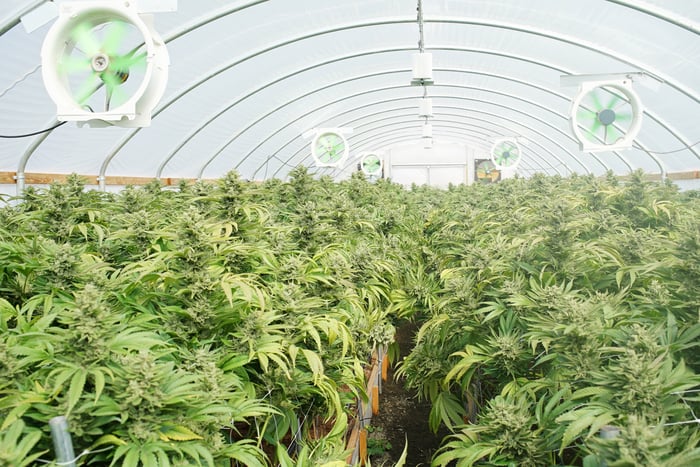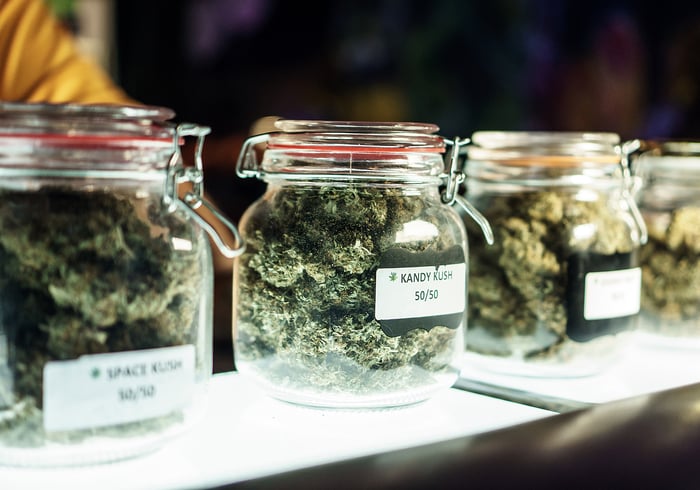Although the ride has been wild, marijuana stocks, as a whole, have "delivered the green" to patient investors.
For those with the foresight, and luck, to invest in some of the most popular names in 2016, you'd be up in the quadruple-digit percentages today. Even those folks who had the wherewithal to buy the Horizons Marijuana Life Sciences ETF at the beginning of the year -- a basket fund with more than four dozen pot stocks of various weightings -- would be up 37% in the first half of the 2019.
But as investors, we also know that not every company in even the fastest-growing industries can be a winner. Of the nearly five dozen marijuana stocks (both pure play and ancillary) that I track, about a third ended the first half of the year lower. And while some skirted lower by just a few percentage points, others were crash-and-burn terrible.
Below you'll find, in descending order, the six worst-performing pot stocks through the first six months of 2019.

Image source: Getty Images.
1. Insys Therapeutics: Down 91%
An easy way to wreck your shareholders' hopes and dreams is to file for bankruptcy, which is exactly what drugmaker Insys Therapeutics (INSY) did last month.
For those who may not recall, Insys Therapeutics was alleged to have bribed physicians to prescribe its fentanyl-based sublingual medicine for breakthrough cancer pain, Subsys, for off-label use, and fabricated speaking engagements for doctors involved in this scheme to make sure that insurers covered these written prescriptions. All told, four Insys insiders, including former billionaire co-founder John Kapoor, were found guilty of racketeering. Facing a large settlement with the Justice Department and tanking Subsys sales, Insys was facing ongoing funding issues and pulled the bankruptcy lever in June.
If you're wondering why Insys is on a list of the worst-performing pot stocks, look no further than its miserable launch of Syndros, an oral dronabinol solution for the treatment of chemotherapy-induced nausea and vomiting. Dronabinol is a synthetic version of tetrahydrocannabinol (THC), the cannabinoid that gets users high. Sales of the drug only came in around $3.3 million in 2018 when, at one time, peak annual estimates had called for at least $200 million. In every sense of the word, Insys has been an investment lemon.

Image source: Getty Images.
2. TILT Holdings: Down 65%
Another disaster du jour in the first half of 2019 is TILT Holdings (TLLT.F 4.64%), which lost almost two-thirds of its value.
TILT was formed by combining four companies -- a Massachusetts dispensary operator, Canadian grower, cannabis-delivery software developer, and customer-relationship software developer -- via a complex reverse takeover. On the surface, the breadth of revenue looked highly promising. But accounting snafus have caused investors to completely lose faith in the company's management team.
Prior to commencing trading on Dec. 6, 2018, in Canada, TILT filed its prospectus with SEDAR (Canada's version of the U.S.'s Securities and Exchange Commission). This lengthy prospectus contained a pro forma total asset value of $905 million for the companies involved (through June 30, 2018), albeit with $721 million in goodwill. However, when TILT filed its fourth-quarter operating results (through Dec. 31, 2018), it announced that an accounting change resulted in a massive $496.4 million writedown, leading to a whopper of a loss of $552 million in 2018. Investors simply don't know what to believe on the company's balance sheet at this point.

Image source: Getty Images.
3. FSD Pharma: Down 42%
Small-cap pot stock FSD Pharma (FSDDF) has also been beaten to a pulp, losing 42% of its share price in just the past six months. Whereas legal issues or accounting woes were to blame for the two larger losses in the first half of 2019, FSD Pharma can put the onus of its poor performance on a severed partnership with Auxly Cannabis Group (CBWTF -2.64%).
Auxly and FV Pharma (a subsidiary of FSD Pharma) had signed a deal in March 2018 that involved the creation of a joint venture (FSD's subsidiary would hold a 50.1% stake) and the construction of a 220,000-square-foot grow farm. But this past January, Auxly provided notice to FV Pharma of certain deficiencies and contractual breaches. Rather than dealing with Auxly's concerns, FSD notified Auxly that the joint venture was terminated just weeks later.
With Auxly, a well-funded and growing royalty provider, now out of the picture, investors are left to wonder what FSD Pharma will do to grow out its cultivation capacity. Until that's answered, this stock may continue to trend lower.

Image source: Getty Images.
4. MariMed: Down 38%
Although it was easily one of the best-performing pot stocks in 2018, MariMed (MRMD -1.57%) has hit the skids in a big way in 2019. Some of this may very well be profit-taking, but it could just as easily be investors wondering what the company has done for them lately.
Initially, MariMed entered the cannabis scene as an advisory business to pot stocks. However, it's been transitioning in recent months to a more direct role in the United States as an operator of medical cannabis dispensaries and grow farms and an investor in the cannabidiol (CBD) space. This past quarter, U.S. vertically integrated operators really took it on the chin, possibly as a result of increasing competition and the need to dilute existing shareholders to raise capital for acquisitions.
More specific to MariMed, investors might be getting anxious to see the company push into profitability. Even with rapid sales growth and a significantly reduced operating loss in the first quarter, MariMed still lost a nominal amount of money. Until profits begin flowing, investors may struggle to justify MariMed's massive run higher last year.

Image source: Getty Images.
5. Green Growth Brands: Down 36%
On the surface, Green Growth Brands (GGBXF) should be having a great year. As the company behind the Seventh Sense line of CBD products, Green Growth has struck deals with Designer Brands and Abercrombie & Fitch to sell its products in-store, as well as with Simon Property Group to open 108 CBD product-focused stores in malls around the country. But there's also been plenty of pressure put on Green Growth's stock.
At the beginning of the year, Green Growth was soaring on speculation that its hostile takeover bid for Aphria would come to fruition, which would have allowed Green Growth to gobble up a top-tier producer on the cheap. Aphria's board overwhelmingly rejected the bid, thereby disappointing investors who thought Green Growth would make one heck of a deal.
The other problem has to do with share-based dilution, which is a concern throughout much of the industry. In order to expand its operations, Green Growth has been using its stock as a financing tool. While perfectly common among pot stocks, a ballooning outstanding share count can dilute existing shareholders and make it that much more difficult for a company to earn a meaningful profit. The former has been true for Green Growth, with its bottom line showing a much wider loss in its March-ended quarter.

Image source: Getty Images.
6. Tilray: Down 33%
Last among the worst pot performers in the first half of the year is Tilray (TLRY), which has lost a third of its value.
Despite being a popular marijuana stock in 2018 following its July IPO, shares have cooled following the company's subdued operating results and recent strategy shift. In March, CEO Brendan Kennedy announced that Tilray would focus future investments on the U.S. hemp market and Europe's medical cannabis market, rather than Canada, which is an odd move to make with its home country just now getting recreational weed off the ground. With plenty of capacity, but relatively minimal investment in added production, investors are rightly confused where Tilray and its management team go from here.
The other issue, as noted, has been Tilray's operating results. In back-to-back quarters, the company has delivered gross margin of 20% and 23%, with Tilray's reliance on wholesale-purchased cannabis to meet supplier agreements weighing on results. According to management, it could be another year before Tilray has a shot at profitability, which isn't what Wall Street wants to hear from a $4 billion-plus market-cap company.





